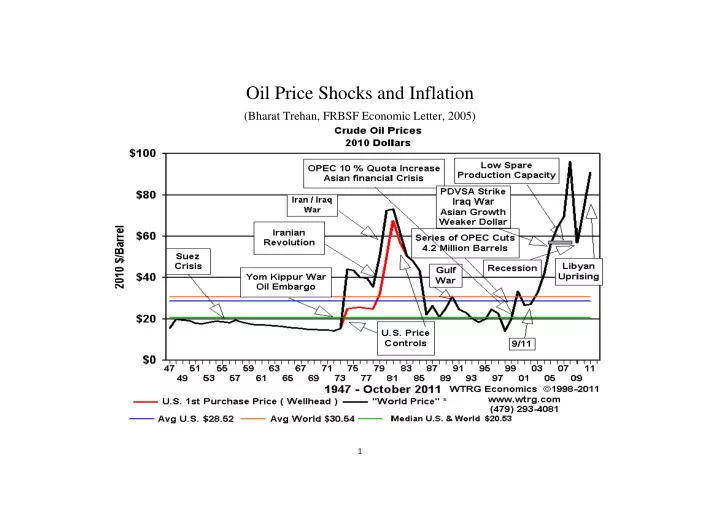

Oil Price Shocks and Inflation (Bharat Trehan, FRBSF Economic Letter, 2005) 1
When oil price increases during the 1970s, they were associated with severe recessions and inflation (Stagflation). Why hasn’t that happened since oil price rose around 2004? 2
Petroleum products are household consumables and production inputs. Rising oil prices raises cost of living and cost of production. Hooker (2002): Statistical tests found a structural break in the estimated relationship between oil price and inflation. Oil prices had a significant impact on inflation during 1962–1980, but not in the period 1981–2000. 3
Possible explanation: The economy was more energy-intensive in the 1970s, thus the effects are likely to have been larger. Hooker (2002): the substantial decline in the energy intensity of the economy since the 1960s and deregulation in the energy sector did not help explain the change in the relationship between oil prices and inflation. 4
Alternative explanations: A change in the conduct of monetary policy and a change in commodity markets. Clarida, Galí, and Gertler (2000): the Fed now reacts much more vigorously to changes in inflation than it did during the 1960s and 1970s.This has led to a marked decline in core inflation and inflation volatility. Various surveys reveal that the decline in inflation has been accompanied by a decline in inflation expectations ; further, it is generally agreed that inflation expectations are much better contained than they were in the 1970s. The credibility of the Fed in fighting inflation has led to a fall in inflation expectations. 5
Commodity prices (crude oil, gold, cotton, coffee, wheat, beef…) are sensitive to inflation expectations. Volatile inflation expectations may well have dominated the behavior of commodity prices during the 1970s, which may explain their ability to predict inflation during that period. The volatile expectations themselves reflected the conduct of monetary policy. Commodity prices are now more likely to reflect developments specific to the commodity sector itself, and thus may not provide that much information about inflation. 6
Recommend
More recommend